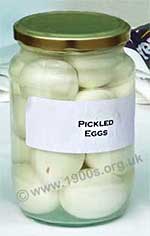How to preserve eggs by pickling in salt and vinegar

During the rationing and shortages of the Second World War, it was common to keep chickens, so there was frequently a surplus of eggs which had to be preserved for leaner times. This page describes the method of preserving eggs by pickling in salt and vinegar. The page concludes with other uses of vinegar in the past.
____
By Peter Johnson who regularly saw eggs preserved by pickling during WW2, edited by the webmaster
A family method for preserving eggs in salt and vinegar
My mother would preserve our eggs by boiling them for about ten minutes in water to which a little salt and vinegar had been added.
When the eggs were hard-boiled, they were held under the cold tap, which stopped a black ring around the yolk from forming. The shells were quickly removed and into preserving jars they went.
Once in the preserving jars they were covered with either white or brown vinegar. The method was known as pickling and result was known as pickled eggs.
I can't remember ever using isinglass or waterglass.
These jars of eggs were in great demand in pubs and fish and chip shops. Even to this day they are to be found in many fish and chip shops.

Jar of pickled eggs
For more about vinegar, its uses to preserve vegetables and its uses generally, see below.
The forerunner of scotch eggs
Some of these pickled eggs were covered in meat paste and breadcrumbs - hence the "scotch egg".
Writing this I can still smell that eggy-vinegar smell even now.
More about vinegar for preserving food and its uses in the past
How vinegar used to be sold
Vinegar was sold 'loose' before around the middle of the 20th Century. You just took a container to the local shop and they would fill it up from a giant wooden barrel.
Types of vinegar
There were three types of vinegar: white and brown malt vinegar and pickling vinegar which was brown vinegar to which some hot spices had been added during manufacture.
-
You could pickle cabbage and beetroot in vinegar.
-
You could add fresh mint to vinegar, and you had mint sauce throughout the winter because the vinegar preserved it.
Common uses of vinegar
Vinegar was very versatile:
-
People even washed their hair in vinegar to get rid of fleas.
-
Vinegar was added to the rinse when washing cloths and bed sheets that were badly soiled.
-
If you grazed your skin, a vinegar poultice would be applied: a piece of clean cloth soaked in vinegar would be tied to the wound. A touch of Florence Nightingale and the Crimea, I think.
-
Vinegar was even used to clean the windows - one of the best methods of cleaning glass ever thought of.
-
Before Listerine was invented, a little vinegar was mixed with water for use as a mouth wash.
-
The best smell from my childhood was brown vinegar sprinkled on hot fish and chips.
| sources | webmaster | contact |
Text and images are copyright
If you can add anything to this page or provide a photo, please contact me.



